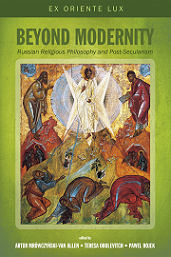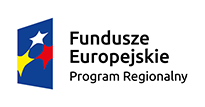 |
Artur Mrówczyński-Van Allen, Teresa Obolevitch, Paweł Rojek (eds)
Beyond Modernity: Russian Religious Philosophy and Post-Secularism
Eugene, OR: Pickwick Publications 2016, s. 284, ISBN 978-1-4982-3977-6.
The book might be purchased at Wipf and Stock Publisher. By kind permission of the Publisher a part of the book might be downloaded here.
|
Post-secularism is the fundamental evidence of the end of modernity. Modernity, as sleeping reason in Francisco Goya’s painting, realizes that, although it thought that it was awake, it was producing monsters. We try to analyze post-secular philosophy from the point of view of Russian religious thought. We believe that such philosophers as Vladimir Soloviev, Pavel Florensky, Sergey Bulgakov, Nikolai Berdyaev, Georges Florovsky, and Semen Frank may be helpful for understanding and overcoming post-secular order. Their unique views on the relations between religion and philosophy, science, and social life are apparently missing in the current Western debates. It seems to us that Russian religious philosophy becomes surprisingly up-to-date and attractive in the contemporary world. We hope that the present volume will be a significant step forward in the inclusion of the heritage of Russian religious philosophy in contemporary debates.
Presently the phenomenon of post-secularism is at the center of the intellectual debate. The authors of the papers included in this volume reflect on this phenomenon in the context of Russian religious thought, which is still not generally known in the West. However, already more than century ago Russian thinkers could foresee many of the most painful issues challenging contemporary society. I believe that this book will be interesting not only for the academic milieu but also for all searching for answers to the crucial questions of our day.
Irina Yazykova, art historian; vice-rector, St. Andrew’s Biblical Theological Institute
This is a highly valuable and most impressive contribution to current discussions on Russian religious philosophy, its substance, method, and relevance. The authors offer several constructive approaches to the heritage of Russian Christian philosophy by means of comparison with the discourse on post-secularism. It is clearly demonstrated how Russian philosophers such as Vladimir Soloviev, Sergey Bulgakov, Pavel Florensky, and others enrich and challenge our philosophical and theological understanding of secularism and secularization.
Elena Namli, professor of theological ethics, Uppsala University
Maybe Russia is not the home of elephants, contrary to the Soviet joke, but at least this volume proves convincingly that she is the cradle of post-secularism. The book shows that ages before the term post-secularism was coined, Russian thinkers developed a vast array of original models deconstructing the binary opposition of religious vs. secular and established creative dialogue between these two worlds. They were post-secular long before the birth of post-secularism, and this surprising Wahlverwandschaft in the history of ideas is displayed here for the first time. I assume it is a good start for a new reception of modern Russian thought.
Sergey Horujy, founder and director of Institute of Synergic Anthropology, Moscow; honorary professor, the Russian Christian Academy of Humanities, St. Petersburg
Reviews
- Dimitrios Avdelas, Filosofein (2017), vol. 16, pp. 237–243 (in Greek)
- Andrej Puhaev, Folia Petropolitana (2017), vol. 6, no 1, pp. 158–159 (in Russian)
Content
Introduction
- “Abel, where is your Brother Cain?” The Russian Way of Overcoming Modernity, Artur Mrowczyński-Van Allen, Teresa Obolevitch, Paweł Rojek
Part I: General Overview
- Aspects of the Russian Tradition of Philosophical-Theological Synthesis in the Post-Secular Context: Georges Florovsky, Sergey Bulgakov, Alain Badiou, and the “Theology Dwarf”, Artur Mrowczyński-Van Allen, Sebastian Montiel Gomez,
- “Secularisation” and “Post-Secular” in Russian Religious Thought: Main Features, Konstantin Antonov,
- Post-Secularity vs. All-Unity, Grigory Gutner,
- Post-Secularism: A Preliminary Outline of the Issue with a Certain Ancient Russian Context—Janusz Dobieszewski.
Part II: Systematic Studies
- Eleusa: Secularism, Post-Secularism, and Russian Sophiology, Aaron Riches,
- Russian Sophiology and the Problem of the Subject in Modern Philosophy, Natalia Vaganova,
- Post-Secular Metaphysics: Georges Florovsky’s Project of Theological Philosophy, Paweł Rojek,
- Sergey Bulgakov’s Trinitarian Anthropology: Meaning, Hope, and Evangelizing in a Post-Secular Society, Walter Sisto.
Part III: Historical Focuses
- Friedrich Nietzsche as a Christian Thinker: The Philosophy of Nietzsche in the Context of the Russian Religious Philosophy of the Nineteenth and Twentieth Centuries, Igor Evlampiev,
- Eschatology or Progress? Vladimir Soloviev and his Criticism of St. Philaret of Moscow’s Ecclesiology, Fr. Pavel Khondzinskiy,
- Christianity in the Times of Postmodernism? A Reconstruction of Answers by Sergey Bulgakov and Nikolai Berdyaev, Katharina Anna Breckner,
- Towards a New Understanding of Immanence and Transcendence: The Concept of Kairos in the Writings of Nikolai Berdyaev and Paul Tillich, Monika Woźniak,
- Religion in Public Life according to Nikolai Berdyaev, Halina Rarot,
- Religious Revival and Post-Secular Society according to Pavel Florensky, Nikolai Pavliuchenkov,
- The Philosophy of Culture of Semen Frank and its Significance for the Post-Secular World, Teresa Obolevitch,
- The Way Journal (1925–1941) and the Question of Freedom in the Context of European Post-Secular Culture, Olga Tabatadze,
- Overcoming the Secular: Viktor Nesmelov’s Teaching on Personhood as the Justification of the Radical Theological Commitment in the Dialogue between Faith and Reason, Alexei Nesteruk,
- The Crisis of the Classical Anthropological Model: The Anthropological Mission of Post-Secularism according to Sergey Horujy, Roman Turowski,
- Christian Philosophical Mysticism in the Poetry of “Leningrad’s Underground” as a Challenge to Soviet Secularism, Zhanna Sizova.
Contributors
- Konstantin Antonov, Professor at St. Tikhon’s Orthodox University, Moscow, Russia.
- Katharina Anna Breckner (1962–2015), Independent scholar, Hamburg, Germany.
- Janusz Dobieszewski, Professor at University of Warsaw, Warsaw, Poland.
- Igor Evlampiev, Professor at Saint Petersburg State University, Saint Petersburg, Russia.
- Grigory Gutner, Professor at the Institute of Philosophy of the Russian Academy of Science, Moscow, Russia.
- Fr. Pavel Khondzinskiy, Professor at St. Tikhon’s Orthodox University, Moscow, Russia.
- Sebastián Montiel Gómez, Professor at the University of Granada, Granada, Spain.
- Artur Mrówczyński-Van Allen, Professor at the International Center for the Study of the Christian Orient and Institut of Philosophy “Edith Stein,” Granada, Spain.
- Alexei Nesteruk, Professor at the University of Portsmouth, Portsmouth, The United Kingdom.
- Teresa Obolevitch, Professor at the Pontifical University of John Paul II in Krakow, Poland.
- Nikolai Pavliuchenkov, Assistant Professor at St. Tikhon’s Orthodox University, Moscow, Russia.
- Halina Rarot, Professor at the Lublin University of Technology, Lublin, Poland.
- Aaron Riches, Assistant Professor at the Institut of Philosophy “Edith Stein,” Granada, Spain.
- Paweł Rojek, Assistant Professor at the Pontifical University of John Paul II in Krakow, Poland.
- Walter Sisto, Assistant Professor at D’Youville College, Buffalo, NY, United States.
- Zhanna Sizova, Editor of the Voda Zhivaya Journal, Saint Petersburg, Russia.
- Olga Tabatadze, Assistant Lecturer at the International Center for the Study of the Christian Orient, Granada, Spain.
- Roman Turowski, Doctoral Student at the Pontifical University of John Paul II in Krakow, Poland.
- Natalia Vaganova, Professor at St. Tikhon’s Orthodox University, Moscow, Russia.
- Monika Woźniak, Doctoral Student at the University of Warsaw, Warsaw, Poland.




